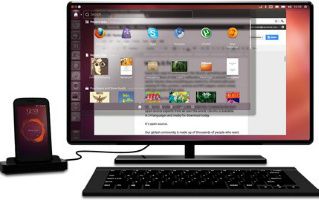Further expanding from its core mission of providing Linux distributions for desktop computers and servers, Canonical is developing a version of Ubuntu for smartphones.
The company plans to market the OS to smartphone handset manufacturers and wireless phone network operators, in part as an alternative to Android. Ubuntu did not announce any carriers or handset manufacturers that publicly plan to build Ubuntu phones yet.
However, users should expect the first Ubuntu smartphones to be released late 2013 or early 2014, said Canonical founder Mark Shuttleworth during a press conference announcing the launch of the phone.
This is not Canonical’s first foray into porting Ubuntu beyond PCs and servers. A year ago, the company launched a version of the open source distribution called Ubuntu TV that can be run on processor-enhanced television sets.
Canonical estimates that Ubuntu is already used on over 20 million desktop computers – Asus, Dell, Hewlett-Packard, and Lenovo all offer computers with Ubuntu pre-installed. With the smartphone version, Canonical is now boasting that it offers a single OS for multiple devices in the home.
Like the massively popular Android, this version of Ubuntu is based on the open source Linux operating system kernel. Unlike Android, however, Ubuntu does not require the Java Virtual Machine (JVM) to operate, which, according to Canonical, should provide a performance boost to handsets running Ubuntu, compared to those running Android.
The company is also taking aim at Android’s fragmentation issue, where different manufacturers offer incompatible customised versions of the OS. Canonical has promised to maintain the code base for multiple mobile platforms.
Because Google’s Android can be freely modified, both carriers and handset manufacturers have extensively modified the OS to add their own features, frustrating developers who have to customise their apps for different versions of Android.
To prevent Ubuntu from fragmenting, Canonical built a set of frameworks that allow handset providers to insert their own content, apps and stylistic modifications to the OS. With these frameworks, handset providers can customise the operating system, while the base OS itself remains consistent across all handsets, which should please third party app developers.
With Ubuntu, Canonical is "trying to find a middle ground between the super locked down proprietary approach and the anything goes, prone-to-fragmentation approach," Shuttleworth said, in an interview with IDG News Service.
When developing the mobile OS, Canonical made sure that it can run all device drivers written for Android, which means phones that run Android could also run Ubuntu. "We wanted to reduce the costs to silicon companies and OEMs [that want to] experiment with Ubuntu," Shuttleworth said.
The design of the OS is novel among smartphone platforms in that each corner of the handset’s touch screen can be used to help navigate through the system. Swiping a thumb across the left hand side, for instance, brings up a tray of apps. And swiping down from the top of the screen will evoke a search service.
The Ubuntu smartphone OS will also offer the ability, on select hardware, to run a full-size desktop monitor, allowing it to potentially serve as a desktop computer.
The OS is compatible with many Android board support packages (BSPs), which are configuration settings for the handset hardware, making it ready to run on many existing mobile chipsets that currently run Android. It will work with handsets running either x86 or Arm processors.
IDG News Service








Subscribers 0
Fans 0
Followers 0
Followers